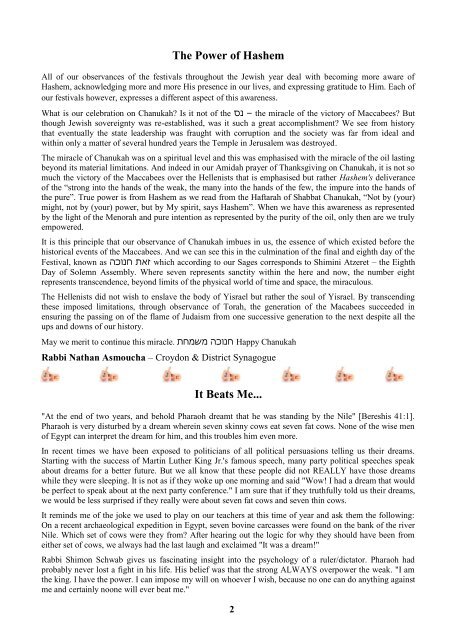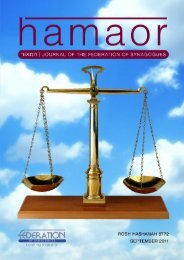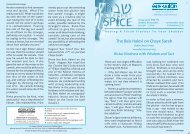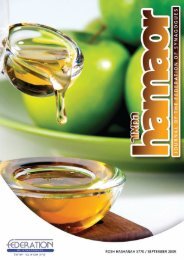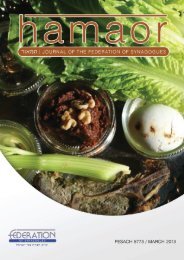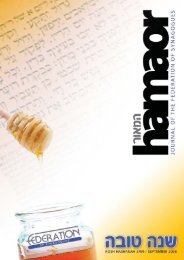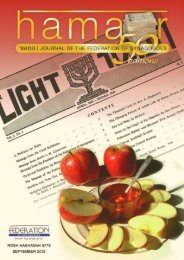Chanucah 5773 - Federation Of Synagogues
Chanucah 5773 - Federation Of Synagogues
Chanucah 5773 - Federation Of Synagogues
Create successful ePaper yourself
Turn your PDF publications into a flip-book with our unique Google optimized e-Paper software.
The Power of Hashem<br />
All of our observances of the festivals throughout the Jewish year deal with becoming more aware of<br />
Hashem, acknowledging more and more His presence in our lives, and expressing gratitude to Him. Each of<br />
our festivals however, expresses a different aspect of this awareness.<br />
What is our celebration on Chanukah? Is it not of the נס – the miracle of the victory of Maccabees? But<br />
though Jewish sovereignty was re-established, was it such a great accomplishment? We see from history<br />
that eventually the state leadership was fraught with corruption and the society was far from ideal and<br />
within only a matter of several hundred years the Temple in Jerusalem was destroyed.<br />
The miracle of Chanukah was on a spiritual level and this was emphasised with the miracle of the oil lasting<br />
beyond its material limitations. And indeed in our Amidah prayer of Thanksgiving on Chanukah, it is not so<br />
much the victory of the Maccabees over the Hellenists that is emphasised but rather Hashem's deliverance<br />
of the “strong into the hands of the weak, the many into the hands of the few, the impure into the hands of<br />
the pure”. True power is from Hashem as we read from the Haftarah of Shabbat Chanukah, “Not by (your)<br />
might, not by (your) power, but by My spirit, says Hashem”. When we have this awareness as represented<br />
by the light of the Menorah and pure intention as represented by the purity of the oil, only then are we truly<br />
empowered.<br />
It is this principle that our observance of Chanukah imbues in us, the essence of which existed before the<br />
historical events of the Maccabees. And we can see this in the culmination of the final and eighth day of the<br />
Festival, known as זאת חנוכה which according to our Sages corresponds to Shimini Atzeret – the Eighth<br />
Day of Solemn Assembly. Where seven represents sanctity within the here and now, the number eight<br />
represents transcendence, beyond limits of the physical world of time and space, the miraculous.<br />
The Hellenists did not wish to enslave the body of Yisrael but rather the soul of Yisrael. By transcending<br />
these imposed limitations, through observance of Torah, the generation of the Macabees succeeded in<br />
ensuring the passing on of the flame of Judaism from one successive generation to the next despite all the<br />
ups and downs of our history.<br />
May we merit to continue this miracle. חנוכה משמחת Happy Chanukah<br />
Rabbi Nathan Asmoucha – Croydon & District Synagogue<br />
It Beats Me...<br />
"At the end of two years, and behold Pharaoh dreamt that he was standing by the Nile" [Bereshis 41:1].<br />
Pharaoh is very disturbed by a dream wherein seven skinny cows eat seven fat cows. None of the wise men<br />
of Egypt can interpret the dream for him, and this troubles him even more.<br />
In recent times we have been exposed to politicians of all political persuasions telling us their dreams.<br />
Starting with the success of Martin Luther King Jr.'s famous speech, many party political speeches speak<br />
about dreams for a better future. But we all know that these people did not REALLY have those dreams<br />
while they were sleeping. It is not as if they woke up one morning and said "Wow! I had a dream that would<br />
be perfect to speak about at the next party conference." I am sure that if they truthfully told us their dreams,<br />
we would be less surprised if they really were about seven fat cows and seven thin cows.<br />
It reminds me of the joke we used to play on our teachers at this time of year and ask them the following:<br />
On a recent archaeological expedition in Egypt, seven bovine carcasses were found on the bank of the river<br />
Nile. Which set of cows were they from? After hearing out the logic for why they should have been from<br />
either set of cows, we always had the last laugh and exclaimed "It was a dream!"<br />
Rabbi Shimon Schwab gives us fascinating insight into the psychology of a ruler/dictator. Pharaoh had<br />
probably never lost a fight in his life. His belief was that the strong ALWAYS overpower the weak. "I am<br />
the king. I have the power. I can impose my will on whoever I wish, because no one can do anything against<br />
me and certainly noone will ever beat me."<br />
2


